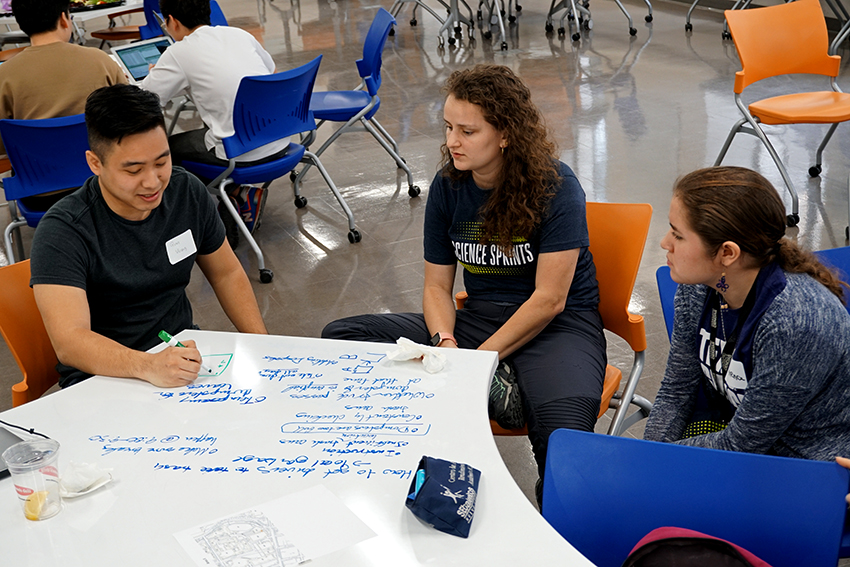UT students participated in Science Sprints on Saturday to tackle science-related problems across campus.
Science Sprints — intensive one-day events hosted by the College of Natural Sciences — bring together teams of 10-25 undergraduate students to work on science and technology-related projects. This semester, the Sprints were held on Feb. 2 and Feb. 16.
“We built the program hoping to give students the opportunity to explore an area they might be interested in as a stepping stone for other opportunities,” said Sarah Eichhorn, program director and executive director of Texas Institute for Discovery Education in Science. “It’s meant to be a fun environment where you’re working in a team with faculty and experts on hand to consult.”
Last weekend’s sprints tackled problems ranging from biodiversity to nutrition.
One of the sprints, called Increasing Route Efficiency Through Campus, was in partnership with UT Facilities and focused on finding more efficient routes for facility workers and UT vehicles to use when traveling across campus.
“(UT Facilities) put data loggers on two dozen vehicles and found that workers were spending three-and-a-half hours of an eight hour work day driving,” said Markus Hogue, Sprint leader and landscape services program coordinator. “Students are analyzing the data and then making a presentation to the head of facilities about ways to increase travel efficiency.”
Biology senior Naren Makkapati and computational biology junior Megan Chan participated in this sprint. Makkapati and Chan used data analysis to look at different factors, including whether passing periods between classes slowed down drivers.
Chan said she had received emails in the past about Science Sprints and wanted to try it out.
“This semester, I wanted to do something computational,” Chan said. “It’s also interesting because we know that things get pretty crowded around passing periods and so that is something that is relevant.”
Makkapati said the problem of finding more efficient routes on campus brings a lot of fascinating data that can be analyzed and used to see what is going on behind the scenes.
“It would be really awesome to see what is actually happening,” Makkapati said.
Biochemistry sophomore Marco Hernandez was part of the UT v.s. Global Food Environments sprint. He and other students worked on developing a video about nutrition on UT campus and comparing it to global college food environments.
“(The sprint team is) investigating the food environment here at UT and monitoring whether the nutritional content of the food on campus is meeting certain guidelines,” Hernandez said. “We did interviews and surveys, and we want to see if there is room for improvement.”
Science Sprints give students the rare opportunity of spending eight hours intensely working on a real problem with other students in their discipline, Eichhorn said.
“Some things students can get out of a sprint are experience with teamwork, communication skills and a meaningful problem-solving opportunity,” Eichhorn said.





















